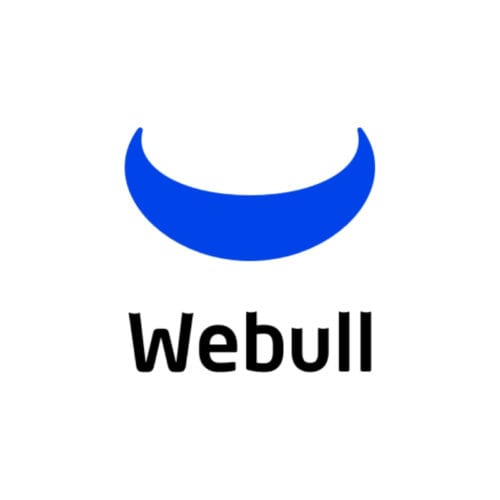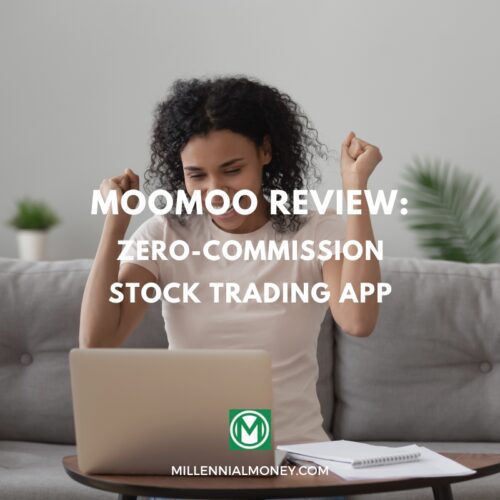Many of you are asking: “Is Webull better than Robinhood?” This is a valid question.
For starters, both companies offer commission-free trading and don’t require account minimums or minimum balances. They also both offer options trading and amazing investing apps that cater to the same clientele: savvy millennial investors like yourself!
In this post, I am going to talk about where Webull and Robinhood overlap and what sets them apart so you can decide which company is a better place to grow your nest egg.
Let’s get started.
About Webull
Webull is an online brokerage firm that offers commission-free trades on stocks, options, ETFs, and other securities. Customers can sort through a wide range of investment options on Webull’s robust trading platform, which, to be honest, probably offers more advanced features than an average investor will ever need.
Learn More:
About Robinhood
Robinhood is also an online brokerage firm, and they are the pioneer of free stock trading. The company’s goal is to reduce fees and simplify the investment process so that everybody can grow their earnings in the market. Robinhood Gold is the company’s premium trading account, which offers more advanced analysis tools and margin trading for those with more investment experience.
Learn More:
Robinhood vs. Webull: What Sets Them Apart?
First, let’s cover the main things that set these two account types apart.
Webull Caters To More Advanced Traders
The main thing that stands out to me is that Webull offers a much more advanced trading platform. It’s the type of platform that day traders and advanced traders could really take advantage of as they make their journeys toward financial independence. Webull also offers a trading simulator, which is also called paper trading, that allows you to practice trading stocks without the risk of losing any real money.
However, if you’re new to investing or are just looking to buy-and-hold some ETFs, Webull’s platform is much more than you need. For example, if you need to use limit orders or stop limits or want to practice short selling, Webull has you covered. If you don’t know what those terms mean, then you’d probably be in over your head.
Webull even offers a desktop and web browser app for both Windows and Mac users, which makes sense when you think about it. Serious traders are sitting on their computers all day, analyzing the market, and calculating their next moves. They aren’t buying stocks on a whim while waiting in line at the coffee shop.
Bottom Line: If you frequently trade stocks and want to dabble with more advanced investment tactics like short selling, Webull is probably your better option.
Webull Offers IRA Accounts
This is another huge differentiator between the two companies. Webull customers can invest in a tax-advantaged individual retirement account (IRA). This means that you can deduct a portion of your income that you invest in your Webull IRA.
Unfortunately, Robinhood does not offer any retirement accounts at the time of this writing, although it would not surprise me if they roll out that feature down the road.
I am a huge advocate of investing as much as you can afford in IRAs, for a number of reasons. For starters, you can save a ton of money on taxes. Also, you won’t be able to touch the money you invest in your IRA until you retire, which means it has a much better chance to grow, thanks to compounding interest and incentives.
The only downside to IRAs is that your money is tied up until you retire. If you need to take it out before you reach retirement age, you could be looking at some penalties.
Webull is also offering a pretty sweet promotion for new IRA account holders. New customers who deposit at least $5,000 into an IRA account can get an Amazon gift card. Here is a breakdown of how much you can earn:
| Amazon Gift Card Bonus | Required IRA Deposit or Transfer Amount |
| $50 | $5,000 to $9,999 |
| $110 | $10,000 to $24,999 |
| $220 | $25,000 to $99,999 |
| $330 | $100,000+ |
It may not be much. But it’s certainly better than nothing!
Robinhood Cash Management Is In The Works
With individual brokerage accounts, you have to transfer your cash over from your primary checking or savings account or from your high-yield savings account (HYSA) in order to start making trades. Basically, it’s an extra step that might limit some people from investing as much as they should.
In the near future, Robinhood plans to roll out a cash management feature that promises to grow your uninvested cash at an annual percentage yield (APY) of 0.30%. Granted, this is a lower APY than you’ll see at some of the leading HYSAs. But 0.30% is still well above the national average for checking accounts.
So, this could be a good option for you to store the extra $5,000 or $10,000 that you plan to invest. The idea is that you won’t have to wait around for a few days for your funds to hit your Robinhood account when you are ready to make a trade. In volatile markets, this could mean all the difference between making the right move at the perfect time.
Robinhood Offers Cryptocurrency Trading and Fractional Shares
On the Robinhood Crypto platform, which is a separate account from an individual brokerage account, you can buy and sell leading cryptos like Bitcoin and Ethereum. So, if you’re keen on trading cryptos, it might be nice to know that you can do it on the same platform you are handling your stock trades.
This factor alone could be a dealbreaker for some — just like how Webull offers IRAs and Robinhood does not. It all comes down to your investment strategy and what features you need.
You can also purchase fractional shares of stocks with Robinhood, which you cannot do with Webull.
Robinhood vs. Webull: Where They Overlap
Tech-Focused, Online-Only
Both Robinhood and Webull are heavily tech-focused.
You can set up watchlists on both platforms so that you can monitor the stock market and make trades when you’re ready. Robinhood Gold offers level II market data, which includes more advanced analyst ratings and Morningstar reports, while Webull’s robust platform uses a variety of technical indicators to help guide your trading decisions.
Both companies’ mobile apps are extremely well-rated. In the App Store, Robinhood takes the slight edge, with an average rating of 4.8 stars, while Webull is rated at 4.7 stars. Either way you look at it, these are some amazing ratings for trading apps, considering that both firms are relatively new.
Webull does take things one step further by offering a desktop platform. But if you’re a passive or beginning investor, you probably don’t even need that.
As you might expect, neither Webull nor Robinhood have brick-and-mortar branches. If you prefer having the ability to meet a financial advisor face to face, you may be better off parking your funds elsewhere.
Both Are FINRA Members and SEC-Regulated
Webull and Robinhood are both SEC-regulated and are members of the Financial Industry Regulatory Authority (FINRA). This means that they are required to abide by rigorous compliance and data protection laws and that they’ve been thoroughly vetted as legitimate places to invest your money.
What’s more, both Webull and Robinhood are covered by the Securities Investor Protection Corporation (SIPC), which means that your funds are insured up to $500,000. Talk about peace of mind!
Extended Trading Hours
Standard trading hours are from 9:30 a.m to 4:00 p.m. Eastern Time. If those hours won’t cut it for you, both Webull and Robinhood offer extended trading hours.
Webull’s trading hours go from 4:00 a.m. to 8:00 p.m. Eastern Time while Robinhood’s only stretch from 9:00 a.m. to 6:00 p.m. Eastern Time.
Webull takes the trophy here, but again, average investors won’t be making traders at 4:15 a.m. on a workday.
You Need $2,000 to Open a Margin Account
If you want to trade on margin, you will need at least $2,000 to qualify for a Robinhood Gold account or have a minimum balance of at least $2,000 in your Webull trading account.
Keep in mind that margin trading is risky business, though, so I don’t recommend this strategy for everyone unless you really know what you are doing.
Sign Up Promotions
It’s pretty rare for financial investment firms to offer sign up bonuses. But guess what? Both Webull and Robinhood have some attractive promotions going on right now. I would guess this fact alone is a major reason so many of my readers are wondering which company is better to sign up with.
Here is a quick rundown of how their sign up promotions work:
Webull Promotions
Webull is currently offering two free stocks for new individual brokerage account holders. The first stock is awarded when you open up an account. The second one is given once you add at least $100 to your account balance. Webull is also offering Amazon gift cards for new IRA account holders (as I mentioned above).
Robinhood Promotions
Robinhood has a free stock promo going on as well, where you get a randomly selected stock for opening a new account. You can also earn a free stock for each friend that you refer. Pretty awesome.
Learn More:
When comparing both Webull’s and Robinhood’s sign up bonuses side by side, Webull takes the slight edge because they appear to offer more value in the stocks they assign.
Also, while both firms select your stocks at random, the highest you can earn from Robinhood’s free stock bonus is $200, whereas you can earn up to $1,650 when you sign up and fund a new Webull account — if you’re lucky.
Truth be told, I’d imagine you are unlikely to get super valuable stocks for free just from opening your account, but you never know. I just wouldn’t bank on it.
Neither Company Offers Mutual Funds
If you are looking to buy or sell mutual funds, you won’t be able to do that with either Robinhood or Webull. It’s that simple.
To be honest, I’m not sure why these companies don’t offer mutual funds, which you can easily purchase with larger firms like Fidelity and Charles Schwab, for example. It might have something to do with keeping fees down or the mutual funds not agreeing with their no-fee structures.
I will have to get back to you on that!
Limited Customer Support
New online brokerage firms like Webull, Robinhood, Wealthfront, and Betterment are all the rage these days, and for good reason. But there’s one thing they all have in common that’s a bit of a bummer. If you have questions or want to speak with someone to get financial advice, it can be tricky getting someone on the phone.
While both Webull and Robinhood offer email support and a phone number you can call, it would not be reasonable to expect the same level of customer service that you might expect from more established institutions like Schwab, Fidelity, or Vanguard.
Both firms do offer a ton of self-help resources, though. And, Webull does have a customer support line that you can contact 24 hours each day.
In both cases, the idea is that by having fewer customer support agents on staff, they can keep their costs lower. These cost savings is then passed onto customers through benefits like zero commission on trades. This might not be such a bad trade-off. But it’s just something to keep in mind if you’re the type of person who often calls up customer service.
So, Which One is Better: Robinhood or Webull?
Here is a breakdown of where each firm shines to help guide your decision:
Where Webull Shines:
- Better platform for active traders
- IRA accounts available
- Wider access to customer service
- Juicier new customer promotions
Where Robinhood Shines:
- Better trading platform for new investors
- Industry-leading mobile app ratings
- You can trade cryptocurrencies
- Cash management option coming soon
Is Webull or Robinhood Best For You?
It would not be fair for me to say which company is better because this is a matter of personal preference. It all boils down to which platform better suits your trading strategies. And, at the same time, who says you can’t use both?
I can say, however, that Webull’s free stock promotion and IRA deposit bonus are more attractive than Robinhood’s new sign up bonus at the moment. I also know that Webull’s customer support team is available 24/7 while Robinhood’s isn’t. At the same time, Robinhood has a crypto-trading platform and offers fractional shares, while Webull does not.
If you’re looking to open a new account with either firm, and those items are important to you (e.g., the sign-up bonus, access to customer support, IRA access, or crypto trading), then you should definitely factor that into your decision.
The bottom line is that everyone’s financial situation is unique, and all investors have different tolerance for risks and different financial goals. You know yourself better than anyone else. Poke around on Webull and Robinhood to see which one is most appealing. If you’re up for it, fire off some funds, make some investments, and hopefully, they’ll grow over time.
Most importantly, be patient, be determined, and stick to the plan. Sooner or later, financial independence will be here before you know it.







No comments yet. Add your own